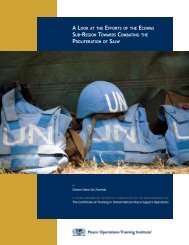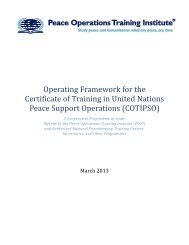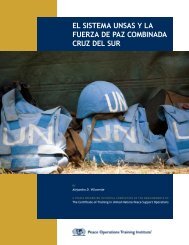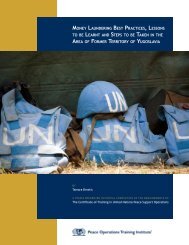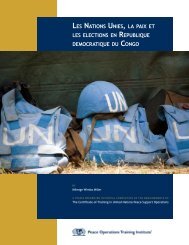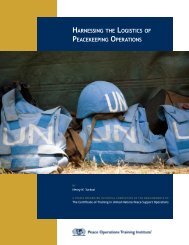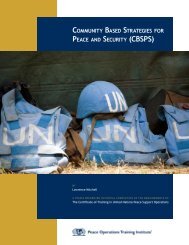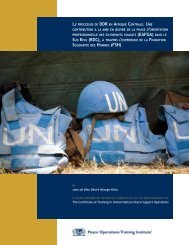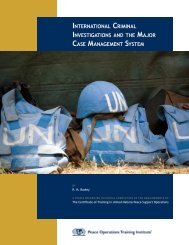the rise and rise of private military companies - Peace Operations ...
the rise and rise of private military companies - Peace Operations ...
the rise and rise of private military companies - Peace Operations ...
You also want an ePaper? Increase the reach of your titles
YUMPU automatically turns print PDFs into web optimized ePapers that Google loves.
Hyder Gulamminimum period. The <strong>companies</strong> should be made responsible under AustralianCorporations’ Law for any breaches <strong>of</strong> human rights or <strong>the</strong> law <strong>of</strong> armed conflict thatmay be committed by <strong>the</strong>ir employees. 131Some o<strong>the</strong>r corporation law specific recommendations include exp<strong>and</strong>ing <strong>the</strong>Australian Securities <strong>and</strong> Investments Commission’s powers to regulate <strong>the</strong> activities<strong>of</strong> PMCs. This would entail a considered amendment to <strong>the</strong> ASIC Act 2001. Similar to<strong>the</strong> current ASIC powers under legislation, <strong>the</strong>se amendments would permit ASICextensive powers to investigate suspected contravention <strong>of</strong> <strong>the</strong> Corporations Act 2001on its own initiative. The proposed amendments could also provide ASIC wideinformation-ga<strong>the</strong>ring powers to facilitate its investigation, including powers toinspect books <strong>and</strong> records. 132 O<strong>the</strong>r amendments could also include providing <strong>the</strong>courts wide jurisdiction to examine <strong>the</strong> overseas activities <strong>of</strong> PMCs, per s.1338A <strong>of</strong><strong>the</strong> Corporation Act.The Australian government could also consider deploying an integrated <strong>military</strong>diplomaticteam with <strong>the</strong> PMC to provide overall guidance <strong>and</strong> monitoring <strong>of</strong> <strong>the</strong>existing provisions <strong>of</strong> IHL. This could also monitor <strong>the</strong> belligerent parties inupholding <strong>the</strong> provisions <strong>of</strong> <strong>the</strong> Geneva Conventions <strong>and</strong> providing for mechanismssuch as <strong>the</strong> International Committee <strong>of</strong> <strong>the</strong> Red Cross (ICRC) to monitor conflicts foradherence to international law. This would dovetail with <strong>the</strong> current action <strong>of</strong> <strong>the</strong>ICRC as it is preparing to implement a policy to ensure that <strong>the</strong> humanitarianst<strong>and</strong>ards <strong>of</strong> international law are upheld by <strong>private</strong> contractors who support worldarmed forces in areas <strong>of</strong> conflict. 133 In fact, under Article 90 <strong>of</strong> Additional Protocol 1,<strong>the</strong> ICRC could activate <strong>the</strong> dormant International Humanitarian fact FindingCommission. The Australian government could also ensure that <strong>the</strong> activities <strong>of</strong>PMCs are open to UN observers. This would ensure <strong>the</strong> monitoring <strong>of</strong> <strong>the</strong> actions <strong>of</strong><strong>the</strong> PMC in order to provide greater transparency <strong>of</strong> its actions <strong>and</strong> thus help allay <strong>the</strong>concerns <strong>of</strong> <strong>the</strong> international community. 134In addition, a similar register to <strong>the</strong> U.N. Register <strong>of</strong> Conventional Arms, whichcompiles declarations by both importers <strong>and</strong> exporters <strong>of</strong> conventional arms, allowingcross-checking, could be created by <strong>the</strong> United Nations for PMCs. This would containdeclarations by <strong>the</strong> importers, <strong>the</strong> states or groups employing such firms, <strong>and</strong> <strong>the</strong>exporters, <strong>the</strong> PMCs <strong>the</strong>mselves. 135 This function could be overseen by <strong>the</strong> Office <strong>of</strong><strong>the</strong> Special Rapporteur.This is because <strong>the</strong> Special Rapporteur (SR) already has <strong>the</strong> systems <strong>and</strong> expertise inplace. Under <strong>the</strong> original m<strong>and</strong>ate, <strong>the</strong> SR examines <strong>the</strong> question <strong>of</strong> <strong>the</strong> use <strong>of</strong>mercenaries as a means <strong>of</strong> violating human rights <strong>and</strong> <strong>of</strong> impeding <strong>the</strong> exercise <strong>of</strong> <strong>the</strong>right <strong>of</strong> peoples to self-determination. Accordingly, <strong>the</strong> SR seeks <strong>and</strong> receivescredible <strong>and</strong> reliable information from Governments, as well as specialised agencies,131 Christopher Wrigley, ‘The Privatisation <strong>of</strong> Violence: New Mercenaries <strong>and</strong> <strong>the</strong> State’, March 1999,http://www.caat.org.uk/information/issues/mercenaries-1999.php132 Phillip Lipton <strong>and</strong> Abe Herzberg, Underst<strong>and</strong>ing Company Law (12 th Edition), 2004, LawbookCompany, p.556.133 Michael Sirak, ‘ICRC calls for contractor accountability in war’, Janes Defence Weekly 10 May2004, p.4.134 Op cit, fn.43 at 112.135 Op cit, fn.101, p.22Page 31The <strong>rise</strong> <strong>and</strong> <strong>rise</strong> <strong>of</strong> Private Military Companies




